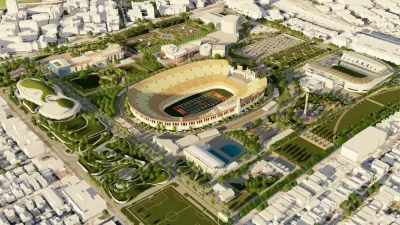Jonathan Pacheco Bell chronicles the growth of a movement he created.

Embedded Planning is a new twist on "inclusive and equitable planning" that emphasizes planners’ presence in the field, and direct action to address community issues. In an American Planning Association (APA) op-ed titled "We Cannot Plan from Our Desks," Jonathan Pacheco Bell, an urban planner in South Central Los Angeles, advocated more field-based planning. He coined the term “Embedded Planning.” Bell advocates impromptu interaction with community members in the field. He argues that "town halls" and community group meetings tend to "attract and prioritize the loudest voices in the room" and that online outreach efforts reach only those with internet skills and access, thus minimizing the input from marginalized populations. Embedded Planning bridges that divide by situating the planner's day-to-day work on the street level.
Since the publication of the op-ed, the idea went viral, especially in university planning programs. Students are now leading the push for Embedded Planning. For more information, see the source article.
FULL STORY: “We Are a Movement”: Students advance Embedded Planning at the 2019 National Planning Conference

Maui's Vacation Rental Debate Turns Ugly
Verbal attacks, misinformation campaigns and fistfights plague a high-stakes debate to convert thousands of vacation rentals into long-term housing.

Planetizen Federal Action Tracker
A weekly monitor of how Trump’s orders and actions are impacting planners and planning in America.

In Urban Planning, AI Prompting Could be the New Design Thinking
Creativity has long been key to great urban design. What if we see AI as our new creative partner?

King County Supportive Housing Program Offers Hope for Unhoused Residents
The county is taking a ‘Housing First’ approach that prioritizes getting people into housing, then offering wraparound supportive services.

Researchers Use AI to Get Clearer Picture of US Housing
Analysts are using artificial intelligence to supercharge their research by allowing them to comb through data faster. Though these AI tools can be error prone, they save time and housing researchers are optimistic about the future.

Making Shared Micromobility More Inclusive
Cities and shared mobility system operators can do more to include people with disabilities in planning and operations, per a new report.
Urban Design for Planners 1: Software Tools
This six-course series explores essential urban design concepts using open source software and equips planners with the tools they need to participate fully in the urban design process.
Planning for Universal Design
Learn the tools for implementing Universal Design in planning regulations.
planning NEXT
Appalachian Highlands Housing Partners
Mpact (founded as Rail~Volution)
City of Camden Redevelopment Agency
City of Astoria
City of Portland
City of Laramie





























